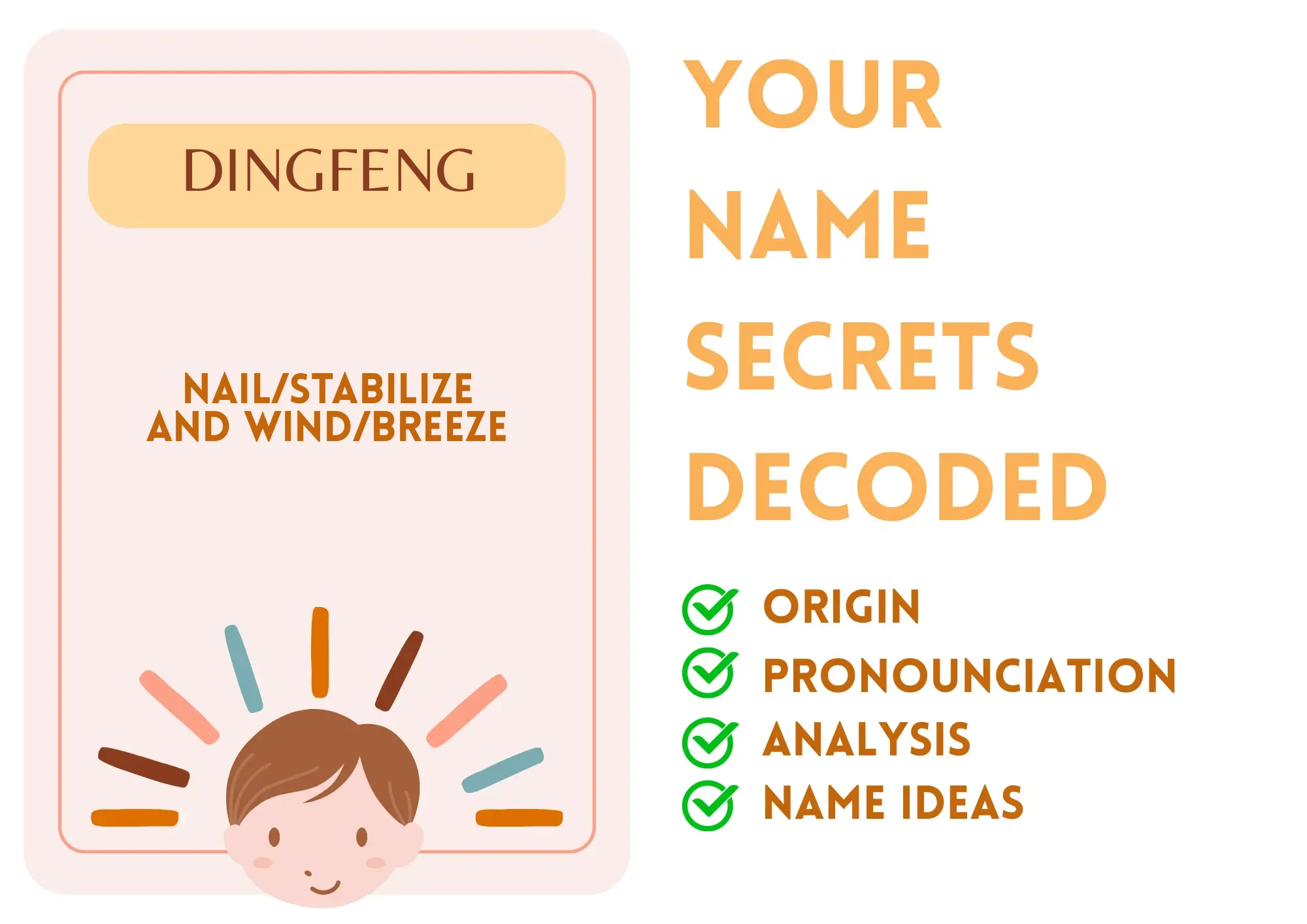
Dingfeng
Dingfeng is a name of Chinese origin, typically used for boys. In Mandarin, 'Ding' (丁) refers to 'nail' or 'stabilize', while 'Feng' (风) means 'wind' or 'breeze', together creating additional layers of meaning related to strength and gentleness. The name embodies dual qualities of stability and fluidity, reflecting the balance between firmness and adaptability.
The name is often perceived positively in Chinese culture due to its meaningful connections with nature and characteristics. It is considered easy to pronounce and remember, as well as simple in writing, following standard Pinyin transliteration.
Dingfeng features prominently within various facets of Chinese literature and folklore, signifying resilience and gentleness. It’s appreciated for both its cultural roots and modern appeal, making it a thoughtful choice for parents seeking a name that conveys both strength and serenity.
Basic Information
Gender: Boy
Sounds Like: DING-fung
Pronunciation Explanation: The first syllable 'DING' is pronounced with a hard 'D' sound followed by a short 'i', and the second syllable 'fung' rhymes with 'hung'.
Summary and Meaning
Meaning: nail/stabilize and wind/breeze
Origin: The name Dingfeng has origins in Chinese, deriving from Mandarin words that carry significant meanings, deeply rooted in cultural and natural elements.
Usage: Dingfeng is primarily a masculine name, reflecting traditional naming practices within Chinese culture.
Name Number (Chaldean)
Name Number (Pythagorean)
Popularity (Global Rank)
Overall: 718509
Boys: 54235
Most Popular in
Religious and Cultural Significance
Religion: Buddhism and Confucianism
Background: In Chinese cultural contexts, names often draw from philosophical or spiritual traditions. Dingfeng can represent a balance of power and tranquility, reflecting ideals from these religions.
Cultural Significance: In Chinese culture, names are chosen for their auspicious meanings; Dingfeng symbolizes the strength to withstand challenges while embracing change, akin to the nature of wind.
Historical Significance: Historically, names like Dingfeng may have been given in hopes of granting good fortune and a strong character to the newborn. They reflect ancestral values tied to nature and resilience.
Popular Culture
Literature and Mythology: Dingfeng may not have direct reference in classical mythology but is emblematic in contemporary Chinese literature portraying characters with a balance of power and adaptability.
Movies and Television: Occasionally, characters named Dingfeng appear in Chinese dramas and films, often highlighting themes of personal growth and resilience against challenges.
Feelings and Perceptions
Perception: Dingfeng is viewed positively, evoking a sense of strength, resilience, and harmony. It carries connotations of connection with nature and stability.
Positive Feelings: Strong, flexible, serene, grounded, nature-connected, auspicious.
Negative Feelings: Some may find the pronunciation tricky depending on regional dialects, potentially leading to inaccuracies.
Practical Considerations
Ease of Writing and Calling: Dingfeng is relatively easy to write in both Chinese characters and romanization. The name consists of two syllables, making it straightforward to pronounce.
Common Typos and Misspellings: Dingfengh,Dingfong,Dingfang
Common Nicknames: Ding,Feng,Dindin
Dingfeng Popularity
Dingfeng Usage and Popularity By Country
| Country | Rank (Overall) |
|---|---|
| Switzerland | 35738 |
| Singapore | 53638 |
| United States | 262335 |
Dingfeng Usage and Popularity By City
| City | Rank (Overall) |
|---|---|
| Peking | 9147 |
Compatibility Analysis
Famous Persons Named Dingfeng
No results found for Dingfeng.
Related Names
Similar Sounding Names:
Dinghui,Dingwei,Dingyu